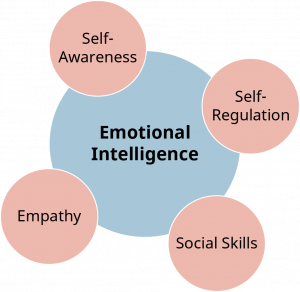4.2 How the Brain Processes Information to Make Decisions: Reflective and Reactive Systems
- What are the two systems of decision-making in the brain?
The human brain processes information for decision-making using one of two routes: a reflective system and a reactive (or reflexive) system.2,3 The reflective system is logical, analytical, deliberate, and methodical, while the reactive system is quick, impulsive, and intuitive, relying on emotions or habits to provide cues for what to do next. Research in neuropsychology suggests that the brain can only use one system at a time for processing information [Darlow & Sloman] and that the two systems are directed by different parts of the brain. The prefrontal cortex is more involved in the reflective system, and the basal ganglia and amygdala (more primitive parts of the brain, from an evolutionary perspective) are more involved in the reactive system.4
Reactive Decision-Making
We tend to assume that the logical, analytical route leads to superior decisions, but whether this is accurate depends on the situation. The quick, intuitive route can be lifesaving; when we suddenly feel intense fear, a fight-or-flight response kicks in that leads to immediate action without methodically weighing all possible options and their consequences. Additionally, experienced managers can often make decisions very quickly because experience or expertise has taught them what to do in a given situation. These managers might not be able to explain the logic behind their decision, and will instead say they just went with their “gut,” or did what “felt” right. Because the manager has faced a similar situation in the past and has figured out how to deal with it, the brain shifts immediately to the quick, intuitive decision-making system.5
Reflective Decision-Making
The quick route is not always the best decision-making path to take, however. When faced with novel and complex situations, it is better to process available information logically, analytically, and methodically. As a manager, you need to think about whether a situation requires not a fast, “gut” reaction, but some serious thought prior to making a decision. It is especially important to pay attention to your emotions, because strong emotions can make it difficult to process information rationally. Successful managers recognize the effects of emotions and know to wait and address a volatile situation after their emotions have calmed down. Intense emotions—whether positive or negative—tend to pull us toward the quick, reactive route of decision-making. Have you ever made a large “impulse” purchase that you were excited about, only to regret it later? This speaks to the power our emotions exert on our decision-making. Big decisions should generally not be made impulsively, but reflectively.
The Role of Emotions
Being aware of the role emotions play in decision-making does not mean that we should ignore them. Emotions can serve as powerful signals about what we should do, especially in situations with ethical implications. You can read more about this particular type of decision-making in the Ethics in Practice box later in this chapter. Thinking through how we feel about the possible options, and why we feel that way, can greatly enhance our decision-making.6 Effective decision-making, then, relies on both logic and emotions. For this reason, the concept of emotional intelligence has become popular as a characteristic of effective managers. Emotional intelligence is the ability to recognize, understand, pay attention to, and manage one’s own emotions and the emotions of others. It involves self-awareness and self-regulation—essentially, this is a toggling back and forth between emotions and logic so that we analyze and understand our own emotions and then exert the necessary control to manage them as appropriate for the situation. Emotional intelligence also involves empathy—the ability to understand other peoples’ emotions (and an interest in doing so). Finally, emotional intelligence involves social skills to manage the emotional aspects of relationships with others. Managers who are aware of their own emotions can think through what their emotions mean in a given situation and use that information to guide their decision-making. Managers who are aware of the emotions of others can also utilize that information to help groups function more effectively and engage in better group decision-making. While emotional intelligence seems to come easily to some people, it is something that we can develop and improve on with practice. A model of emotional intelligence is presented in Exhibit 4.1

Exhibit 4.1 Emotional Intelligence (Attribution: Copyright Rice University, OpenStax, under CC-BY 4.0 license)
CONCEPT CHECK
- Explain the two systems used by the brain in decision-making.
- What is emotional intelligence, and why is it important for decision-making?
Source contents: Principles of Management and Organizational Behavior. Please visit OpenStax for more details: https://openstax.org/subjects/view-all

